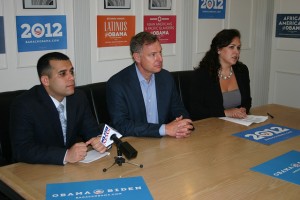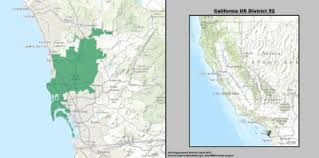At a Clairemont community park Congressman Scott Peters marked the sixth anniversary of the U.S. Supreme Court’s Citizens United ruling by speaking plainly about the deleterious effects it’s had on politics.
“There’s way too much attention on this big money, secret money and raising money for this government to work very well,” Peters said, flanked by a handful of UC San Diego students.
It’s something the San Diego Democrat should know well as the post-Citizens United rules of campaign finance played a key role in both lubricating and obstructing his last re-election campaign in the 52nd District.
On the radio….https://soundcloud.com/inewsource/scott-peters-helped-and-hindered-by-citizens-united-decries-its-impact.WHY THIS MATTERS: Six years after the Supreme Court upended politics with its Citizens United ruling, the influence of money in government continues to strengthen.
In 2014, an array of outside groups — many of them the very vehicles empowered by Citizens United and a related court ruling — reported to the Federal Election Commission spending a total of $7.8 million supporting and opposing Peters and his main Republican opponent Carl DeMaio, according to the Center for Responsive Politics, a D.C.-based nonprofit research organization that tracks money in politics. Of that money, 55 percent went to back Peters (an additional $190,000 went to support DeMaio’s principal Republican opponent in the June primary, Kirk Jorgensen).
That placed the contest 14th in outside spending among 2014 general election House matchups.
In Citizens United, the Supreme Court ruled that political spending is a form of First Amendment-protected speech and thus the government couldn’t ban corporations from spending money in elections.
Plenty of outside spending unaccounted for

Rep. Scott Peters (D-La Jolla) in 2014 received what many called an unlikely endorsement from the U.S. chamber of Commerce…and $250,000.
And $7.8 million is only when tallying up the outside spending that was reported.
Crucially, the above figures do not include money spent on so-called issue ads.
Issue ads can mention a candidate but so long as they do not expressly advocate for or against the election or defeat of that candidate and they do not air within 60 days of a general election or 30 days of a primary, they do not have to be reported to the FEC.
Several such ad buys were made during Peters’ 2014 race, including a $705,000 anti-Peters advertising blitz from the Karl Rove-run Crossroads GPS in August.
In addition, the Koch brothers-backed Americans for Prosperity made anti-Peters ad buys in late 2013 and early 2014, and the League of Conservation Voters paid for a pro-Peters ad blitz back in December 2013.
No reliable source of information is available on the total amount of money spent on such advertising.
Peters had ‘dark money’ allies of his own
What’s more, a subsection of the newly empowered outside spending groups don’t have to report their donors because they’re registered as “social welfare” nonprofits with the Internal Revenue Service.
Related: Pick a PAC, any PAC
At the news conference, Peters said the key provision of his plan to roll back money’s influence on politics would be to require such groups to disclose their donors.
“I’m not about to unilaterally disarm.”
– Rep. Scott Peters
“At a minimum, these multimillion dollar super PACs should have to disclose where their money comes from because voters deserve to know whether these ads are being funded by oil companies or labor unions or environmental groups or whoever,” Peters said. “You ought to know that.“
But some of Peters’ support last time around came from such “dark money” groups. Groups that don’t disclose any of their donors reported spending more than $520,000 to back Peters’ 2014 bid, according to the Center for Responsive Politics data. That’s in addition to the League of Conservation Voters ad buy in 2013.
Neither Crossroads GPS nor Americans for Prosperity, the groups behind the anti-Peters attack ads, discloses its donors.
Asked if it were hypocritical to call for such groups to disclose their donors while simultaneously benefiting from their support, Peters said he had no choice but to play by the rules of the post-Citizens United era.
“I’m the one out here asking to change the system,” Peters said. “There’s tons of people who’ve gotten support from PACs around the country who aren’t raising a finger to change the system.”
Asked if he would disavow support from such groups in his current race, the congressman said he would but only if his opponents did the same.
“I’m not about to unilaterally disarm,” Peters said. “I think if I have opponents who are willing to do that we’d have to consider it, but we have a system that’s corrupt. What I hope you’ll appreciate is that I’m out there asking to change it.”
Peters’ GOP opponents rejected that offer.
Jason Roe, political consultant for small-business owner Denise Gitsham’s campaign, wrote in a statement that “If (Peters) wants to turn down money from organizations this time around, he should do so, regardless of what the other candidates in this race choose to do.”
He added that “Denise welcomes those who believe in and support the principles she espouses, and maintains that more free speech is better for political discourse.”
The campaign of Jacquie Atkinson, a Marine combat veteran and Peters’ other GOP opponent, sounded a similar note.
Anastacia Knepper, Atkinson’s campaign manager, wrote in a statement that “Jacquie will accept money from anyone who believes in her as the right person to protect our country from the dangers coming (from) the Middle East and around the world.”
OPEN SECRETS REVEALS 52ND CONGRESSIONAL DISTRICT 2014 CAMPAIGN FUNDRAISING
http://www.opensecrets.org/races/summary.php?id=CA52&cycle=2014
How much money this time around?
Regardless of whether any candidate asks such dark money groups to stand down, Carl Luna, a political science professor at San Diego Mesa College, said the race in the 52nd Congressional District probably wouldn’t attract the same amount of outside spending as it did two years ago.
“How many mailers do you need to get in your mailbox? How many TV ads do you need to see?”
-Gary Jacobson
“The district is simply less competitive for the Republicans than it was in 2014,” Luna said.
He predicted that a presidential year turnout more favorable to Democrats, two more years of Peters’ incumbency and the lack of a challenger with prior elected experience all would send well-heeled outside spending groups elsewhere.
But Gary Jacobson, a political science professor at UC San Diego specializing in Congressional elections, disagreed.
Noting that “there is a ton of money out there now,” Jacobson suggested that if either of Peters’ challengers showed any skill, “the money will come pouring in.”
But does all this money matter?
Jacobson says that in the most competitive of races, it probably doesn’t.
“In those races where it’s likely to matter, both parties are going to have enough money to more than saturate the market,” he said. Statistical evidence suggests the impact of outside spending in the most competitive races — those where both sides have huge amounts of money at their disposal — is essentially none, Jacobson said.
“How many mailers do you need to get in your mailbox?” he said. “How many TV ads do you need to see?”
inewsource video journalist Megan Wood contributed to this report.
This story has been updated to include a statement from Jacquie Atkinson’s campaign that was received after the story was published.
Joe Yerardi is an investigative reporter and data specialist at inewsource. To contact him with questions, tips or corrections, email joeyerardi@inewsource.org or call (619) 594-5321. By agreement, The Grapevine publishes investigative, in-depth data-driven journalism from independent non-profit inewsource based at San Diego State University’s School of Journalism and Media Studies. For more from inewsource, visit http://inewsource.org/about/.
*************************************************************************************
Legally swapping campaign donations
Rep. Scott Peters, D-San Diego, and other members of Congress have found a way around some campaign contribution limits by exchanging donations with each other.
It’s called donor-swapping, and it works this way: If, for instance, Peters’ wife or parents reach their contribution limit of $5,000 to his campaign, they write a check for, say, $2,000 to another campaign. And that campaign, in turn, writes a check for the same amount to Peters’ campaign.
It’s all legal under Federal Election Commissionregulations and fairly common among the families of wealthier politicians, according to the nonpartisan Campaign Legal Center.
Peters’ family has exchanged several donations with the family of Rep. Ami Bera, D-Elk Grove, and with the campaigns of Rep. Mark Takano, D-Riverside, and former Rep. Kevin Strouse, D-Pa.
Bera, whose father was recently convicted of making illegal donations to his son’s campaign, told The San Diego Union-Tribune that he contributed to Peters’ campaign because Peters is one of his closest friends in Congress, and he regularly faces challenging races.
The New York Times reported that successful incumbents in safe congressional seats raised $1.3 million to keep their seats in 2012, while those who held their seats with less than 60 percent of the vote raised $2.3 million. That averages out to raising $2,315 a day, according to MapLight, a nonpartisan research organization that studies campaign financing.
— KPBS JULY 15, 2016







Be the first to comment on "Scott Peters, helped and hindered by Citizens United, decries its impact"